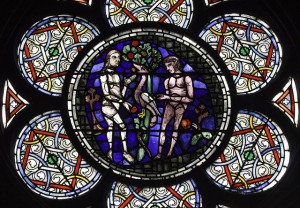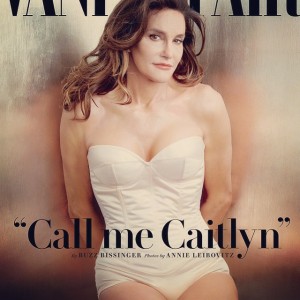Emma Green has a solid piece at The Atlantic detailing religious reaction to Caitlyn Jenner’s appearance in Vanity Fair. It’s mostly what you’d expect: one conservative Christian blogger called Jenner “sick and delusional,” and Roman Catholic Archbishop Salvatore Cordileone of San Francisco “denounced the spread of ‘gender ideology,'” according to RNS’ Michael Gibson.
In some ways, the most interesting take comes from the Southern Baptist ethicist Russell Moore, who starts off by saying, “we do not see our transgendered neighbors as freaks to be despised.” The reality of a fallen world, Moore says, means that we’re all alienated in one way or another “from who we were designed to be,” so there’s no room for Christians to judge transgender individuals.
And then he goes right back to more of what you might expect from a Southern Baptist leader:
“The cultural narrative behind the transgender turn … is rooted in the ancient heresy of Gnosticism, with the idea that the ‘real’ self is separate from who one is as an embodied, material being,” he wrote. “Our transgender neighbors experience real suffering … the answers the culture and the Sexual Revolution-Industrial Complex offer can’t relieve that suffering.”
“This is a straightforward claim about the nature of existence,” says Green:
Individuals can’t define the nature of their “self”; only God can. Feeling discomfort with yourself and alienated from the world is a normal part of being human, Moore is saying, but living as a Christian means accepting that Jesus, and not alterations of the body, is the salve to that feeling of alienation.
Yet there’s more to this claim than simply accepting the body you’ve been given and looking to Jesus for help. Christians like Moore think of gender as a distinctly important and immutable category. Cordileone says that people are born either male or female, and objects to “more and more gender identities being invented.”
In this sort of essentialist perspective, gender becomes a baseline for all human identity. Being slotted as a man or woman indicates the proper roles a person is to play through his or her life. Proponents such as Moore and Cordileone believe that male and female genders are designed to work together, which is why the perspective is often called “complementarity.”
It isn’t just following the created natural order, either. Complementarians often point to the image of Christ the bridegroom of the female church as a kind of basic guide to discipleship. To have faith means to be married to Christ—heterosexually!—as he chose to be married to us.
After a while, you get the sense that gender identity is like the bottom card in a pyramid: you pull it out, and everything collapses. Cordileone even ascribes epistemological significance to complementarity:
“When the culture can no longer apprehend those natural truths,” the archbishop continued, “then the very foundation of our teaching evaporates and nothing we have to offer will make sense.”
Cordileone said the inevitable result “is a reversion to the paganism of old, but with unique, postmodern variations on its themes, such as the practice of child sacrifice, the worship of feminine deities or the cult of priestesses.”
Who knew aging athletes had such power? I’d think that if anyone was going to bring back feminine deities or priestesses, it’d be Billie Jean King. Pete Rose would probably have offered up a kid or two to Moloch if he thought it would get him an extra base.
The former Bruce Jenner in a dress, not so much.
You may say I’m making light of these ideas. I’d say there isn’t much else to be done with theories this thin. Complementarity just isn’t very satisfying. It’s the Taco Bell of theology.
For example, complementarians often rely on a couple of scripture passages which tell us that God created humankind “male and female.” But neither of those passages describes gender roles, let alone prescribes distinct, complementary functions to them. In Genesis 5, the phrase comes at the end of a list of the descendants of Adam and Eve. Its purpose is clearly to make the claim that God of Israel was responsible for creating all the primal ancestors of humanity, not just some or a portion thereof.
Likewise, in Genesis 1, that humankind was made “male and female” comes in the middle of a list of God’s work in creating fish, animals, and plants. So again: God created everything. Unlike some of their neighbors, the ancient Hebrews didn’t believe there were separate gods creating men and women, or one for humans and one for the rest of the natural world. It was all one and the same god who made them all, and made them good.
If we are created in the image of God, whether we are born male or female is irrelevant. We are made good, reflecting something of the nature of God. From that, it follows, I think, there is no prohibition on changing outward gender identity. On the inside, we’re blessed, and that’s what counts.
It could be argued fairly that changing gender identity rejects the goodness of creation. But think about people born intersex, or about those who are sexually mutilated in some way. As Jonathan Merritt has pointed out (including to Russell Moore!), intersex individuals belie the notion that gender is a strict binary. Apparently God creates them male and female and something in-between and also sometimes a bit of both.
I can’t imagine that most Christians would shun a person born with sexual organs from both genders. Nor would they exclude someone who had been castrated. More likely, those people would be welcomed and given love and support. So apparently—in practice if not in theory—holiness is neither completely dependent on physical perfection, nor on alignment between gender identity and physical characteristics.
But the real question here is: What makes us human? Or more precisely, is that which gives us our human identity—our identity as children of God—somehow immutably linked to the gender identity we’re born with?
Moore, Cordileone, and others no doubt would say “yes.” I’m less sure.

Stained glass portrayal of Adam and Eve and the Fall. Photo by Lawrence OP via Flickr.
There’s simply nothing in the Genesis creation accounts to indicate that gender identity is always and everywhere unchanging from birth, any more than it shows there’s no such thing as a child born intersex. And while Eve shows up in Chapter 2 as Adam’s “helper,” it’s worth noting that the discrete roles for man and woman aren’t detailed until after the apple is eaten. In other words, there’s plenty of support to make the argument that rigid gender identity is a result of the Fall.
So if we’re looking for the basis of human identity, we’re going to have find it somewhere other than gender. There are any number of theories out there. But to my mind, what makes us children of God is ability to respond in kind to the yearning love of God, both to God, and to one another.
And human worth is simply a gift from God, dependent on nothing other than God’s grace.
I think that’s a predicate with which even the most conservative Christian would agree. It’s how you defend the worth of someone in a vegetative state, or the “pre-born,” for example.
But accepting such an idea—that our worth is based on God’s loving grace— leads to a surprising result. If worth is not based on identity, then it can’t be based on sexual identity, and therefore there’s no reason that outward sexual characteristics can’t be changed.
More to the point, perhaps, there’s no reason not to accept people whose identities have changed. As Paul tells the Galatians, Christians shouldn’t reject people for being Jewish or Greek, or male or female.
We’re all just human, when it comes down to it. Trans people should be welcomed into the church in the same way.
Oddly, that’s not even a matter of justice, in the sense of including people who were previously marginalized. It’s just straight-up logic. Trans people are people, obviously. Of course they deserve to be included in church life.
We’re not just talking about the church, though. The commentary on Caitlyn Jenner isn’t coming from her pastor, trying to guide a member of the congregation. It’s made by religious leaders attempting to influence the behavior of society at large.
Admittedly, they’re flying a bit blind here, as there’s little, if any, direct guidance in scripture on transgender identity. It just wasn’t a thing back then. There’s no explicit guidance in the Bible about dealing with the Internet, space travel, or viruses, either, but Mike Huckabee isn’t making offensive jokes at their expense.
Christians have to learn to adapt to cultural change in a way that goes beyond “no.” We live in a changing world. That’s what it means to be human, living in time. We need to deal with it.
We don’t have to say, behold, God is doing a new thing! Things change. That’s all. You can say that God is eternal and unchanging, but there’s approximately zero evidence from scripture to say that God is not adaptable, and certainly none that says humans should be inflexible, either.
Transgender people aren’t going away just because some church leaders declare gender reassignment a sin. For one thing, nobody listens to religious leaders anymore, and, as we’ve seen, sexual identity may go deep, but it cannot touch the full depths or reality of human nature.

Caitlyn Jenner on the cover of Vanity Fair magazine. Image by
Movilh Chile via Flickr.
There are always going to be people who don’t fit into the perfect sexual role, no matter how tight the church laces the girdle for them. There are always going to be scared, confused, something-less-than-acceptable people needing Jesus.
Christians need to learn to deal with such folks, as a matter of justice, and because some day, they might be us.
The life of faith, some Christians might argue, is the slow unfolding and recovery of “who we were designed to be,” as Moore says. If that’s the business followers of Jesus are meant to be about, how can we judge trans people who are only doing the same thing and in some ways on level far more profound than most of us will ever reach?
You can call Caitlyn Jenner sick and delusional if you like.
Call her Bruce, if you want to be an asshole.
I’ll call her a pilgrim on the way, just like me.





